Global Mobility is on the rise again and undergoing profound changes

© Visual Generation, AdobeStock
After two challenging pandemic years, companies worldwide are now ready to send their employees abroad again, according to a 2022 study conducted by MSH in collaboration with the market research institute OpinionWay.
Key highlights:
• The Corona pandemic has boosted international mobility: 25% of the surveyed companies have increased the number of their globally mobile employees in 2022.
• In 2023, the main challenge for internationally active companies will be to recruit staff for their global assignments (63 %).
• More than half of companies find it challenging to adapt to changes in the professional world, especially to remote working.
• Almost 40% of companies say they are concerned about evolving mobility policies, mainly those with large numbers of employees abroad.

- © Visual Generation, AdobeStock
After two challenging pandemic years, companies worldwide are now ready to send their employees abroad again, according to a 2022 study conducted by MSH in collaboration with the market research institute OpinionWay.
Based on a sample of nearly 100 corporate clients, including many multinationals with locations in France and Europe, this survey provides an unprecedented assessment of international corporate mobility in 2022.
Thanks to its insights into the "post-pandemic" business landscape, this survey also helps us imagine what the future might look like for globally mobile companies and their employees.
MSH is a global leader in the design and management of international health insurance solutions and the parent company of the Hamburg-based BDAE Group. MSH is a subsidiary of the French DIOT-SIACI Group, a leading insurance brokerage and consulting group.
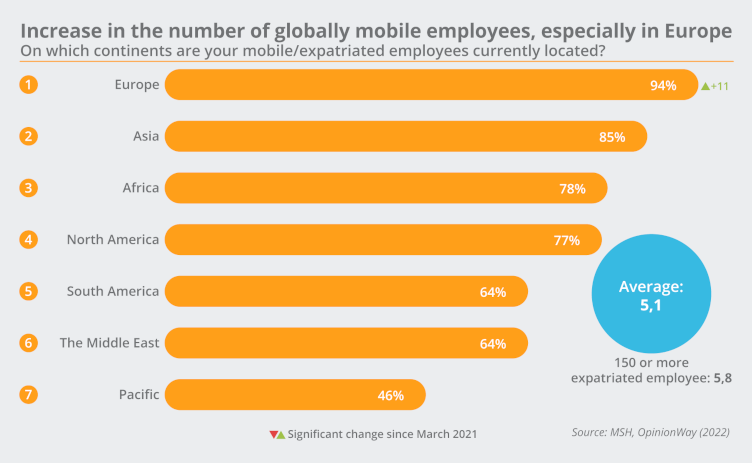
Most international companies want to increase the number and duration of assignments abroad.
The study finds that companies are regaining trust and expanding their international mobility measures for their employees. According to the survey, more than two-thirds (67%) of the companies want to maintain or even increase the number of internationally mobile employees.
The duration of international assignments has remained stable compared to 2021 and even tended to be increased by companies. 88% of the companies have maintained or increased the average duration of international mobility.
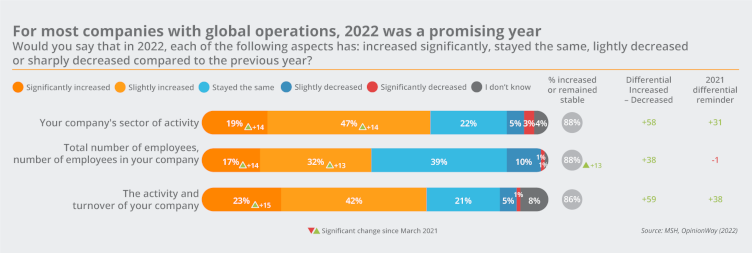
While the economic situation has stabilised or even improved for many of the companies surveyed in 2022 (86 percent reported stable or increasing turnover), this has also had a positive impact on international mobility.
The share of companies that have increased their mobile workforce has risen by 25 percentage points within one year: more than one in four companies (28%) reported that they had increased their expatriate workforce. In the previous year, it was only three percent.
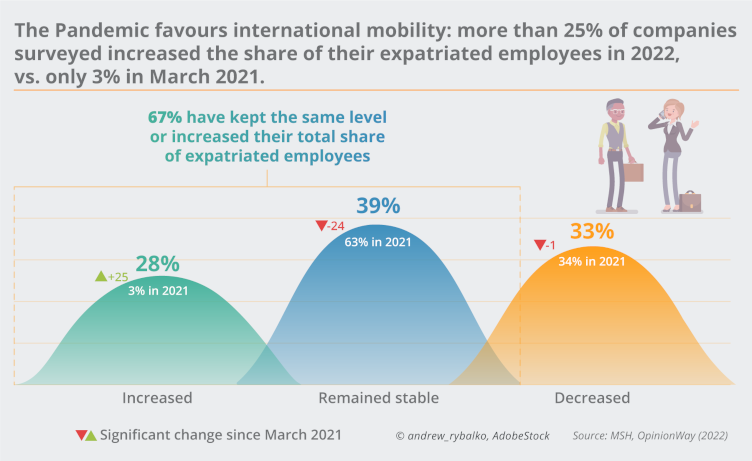
The "war for talent" and "new forms of work" are replacing the pandemic as main concerns of companies.
For a company, establishing an international mobility policy requires attention to many different parameters to ensure optimal functioning. And if the health crisis has been at the top of companies' concerns those last two years, the study reveals that it is now only in fifth position (46%).
Indeed, recruitment, employee retention, and employer attractiveness issues (63%), as well as issues related to changes in work regulations and their impact (56%), have become the most urgent parameters for companies to consider.
Other issues that ranked as more important than the Covid-19 crisis are the uncertain economic situation (51%), energy shortages (48%), rising energy prices (43%), and geopolitical risks (40%).
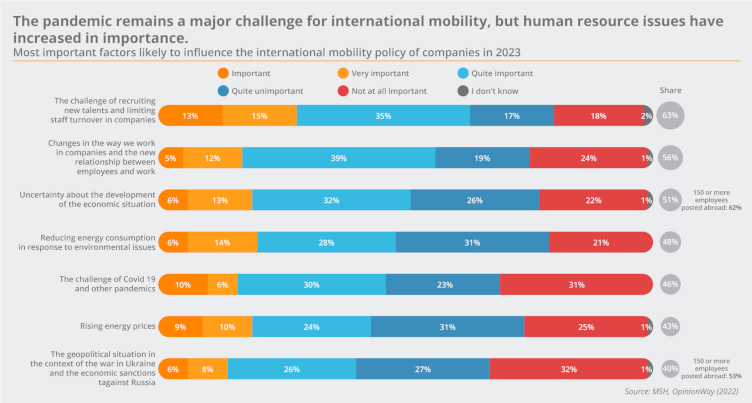
Overall, almost 40% of the companies surveyed believe that these new challenges have had or will have a significant impact on their international mobility policies: 62% were concerned about their impact in 2022, and 38% fear their consequences in 2023.
"After two years of the pandemic taking its toll on companies, they are showing a strong desire for international growth and development. With an eye on the battle for talent and the creation of new ways of working in the future, HR managers are focused on transforming their international mobility policies. MSH is more than ever at their side to support them in this time of change," emphasises Frédéric Grand, Managing Director of MSH.
Global Mobility is on the rise again and undergoing profound changes.
In the face of these new challenges facing companies, international mobility must adapt and undergo profound changes, MSH and DIOT-SIACI sum up.
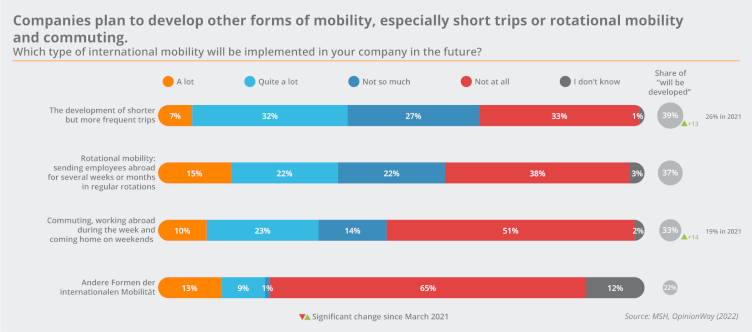
Change is already taking place: more and more companies are developing new strategies for the international employment of employees, such as shorter but more frequent stays abroad (39 percent of respondents), rotational mobility - the regular sending of employees to a foreign location (37%) - or commuting, i.e., the possibility for employees abroad to return home at the weekend (33%).
International remote work is already a reality for two-thirds of companies (mostly "forced" during the first two years of the pandemic). And almost half of them (48%) want to develop it. Of these companies, 15% have already taken steps to formalize their international homeworking policy.
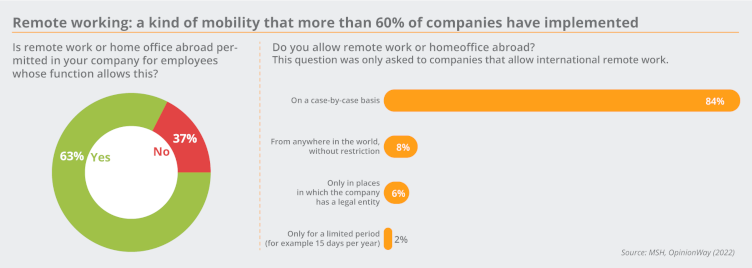
"The results brought to light by our parent company MSH International confirm our perception of the last two years. The world of global employee assignments is undergoing serious changes. In the future, it will become divided into different models, mainly virtual, hybrid, and short-term," says Philipp Belau, CEO of the BDAE Group. "Fortunately, this new divide will benefit both employees and the companies. The pool of potential expatriates is larger than ever, thanks to the new models and the hybrid and flexible forms of secondment. It makes expatriation opportunities even more attractive for workers from all walks of life, as no one has to rearrange their life and take big risks anymore."
ABOUT MSH
MSH, a subsidiary of Diot-Siaci, is a leading global provider of international health, life and disability insurance solutions for internationally mobile individuals. Its offering is aimed at employees of multinational companies, SMEs, employees of international organisations, individual expatriates and high net worth individuals who require international insurance cover.
With a decentralised structure, five regional head offices in Toronto, Paris, Tunis, Dubai, and Shanghai and 21 locations worldwide, MSH provides around-the-clock support to its 2,000 corporate clients and more than 500,000 policyholders in nearly 200 countries.
Visit their website
ABOUT DIOT-SIACI
DIOT-SIACI is a leading multispecialist insurance advisory and intermediary group in France with a presence in more than 40 countries. It designs and develops tailor-made solutions for its clients, including large and medium-sized companies, SMEs and professionals, in both personal and property/liability insurance.
DIOT-SIACI has a stable, family-owned shareholder base that enables it to support its clients over the long term and across the entire value chain in property and casualty insurance, marine and cargo insurance, professional liability, employee benefits and consulting, and international mobility. The Group employs almost 5,000 people and generated a turnover of almost 730 million euros in 2021.
Visit their website
About BDAE
Since 1995, the BDAE Group has focused exclusively on bringing expats, digital nomads and frequent travellers abroad with security. And this is reflected in the broad product range. The insurance policies offered are tailor-made packages that are the result of more than 25 years of special expertise in long-term health insurance abroad. Its own management consultancy - BDAE Consult - supports companies' HR managers with legal questions on the subject of international employee assignments.
Since 2017, the group has been part of the MSH International group, which supports more than 500,000 expats worldwide with its health insurance offerings. This year, BDAE won the jury prize of the Assekuranz Awards for its special concept around international insurance. In 2021, the company received the seal for excellent service from the F.A.Z. Institute. In 2019 and 2020, BDAE was also named the best specialist insurer in Germany by the institute.